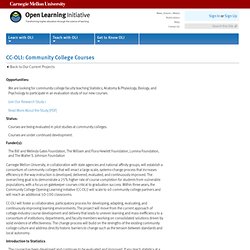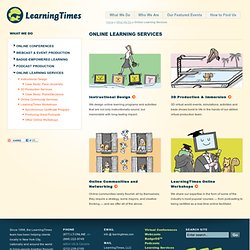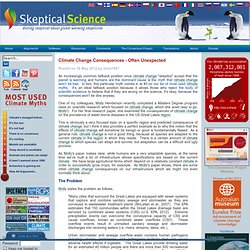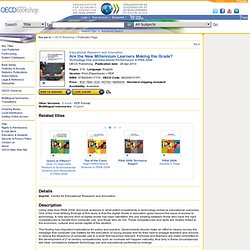

CC-OLI: Community College Courses. Opportunities: We are looking for community college faculty teaching Statistics, Anatomy & Physiology, Biology, and Psychology to participate in an evaluation study of our new courses.

Join Our Research Study > Read More About the Study [PDF] Status: Courses are being evaluated in pilot studies at community colleges. Courses are under continued development. Funder(s): The Bill and Melinda Gates Foundation, The William and Flora Hewlett Foundation, Lumina Foundation, and The Walter S. Carnegie Mellon University, in collaboration with state agencies and national affinity groups, will establish a consortium of community colleges that will enact a large scale, systems-change process that increases efficiency in the way instruction is developed, delivered, evaluated, and continuously improved. CC-OLI will foster a collaborative, participatory process for developing, adapting, evaluating, and continuously improving learning environments. Introduction to Statistics Introduction to Biology. Online Learning Services — LearningTimes. We design online learning programs and activities that are not only instructionally-sound, but memorable with long-lasting impact. 3D virtual world events, simulations, activities and trade shows burst to life in the hands of our skilled virtual production team.

Online communities rarely flourish all by themselves; they require a strategy, some mayors, and creative thinking — and we offer all of the above. We share our expertise in the form of some of the industry’s most popular courses — from podcasting to being certified as a real-time online facilitator. Cutting Edge. Global Warming and Climate Change skepticism examined. Climate Change Consequences - Often Unexpected. Posted on 16 May 2012 by dana1981 An increasingly common fallback position once climate change "skeptics" accept that the planet is warming and humans are the dominant cause is the myth that climate change won't be bad.

In fact, this particular myth comes in at #3 on our list of most used climate myths. It's an ideal fallback position because it allows those who reject the body of scientific evidence to believe that if they are wrong on the science, it's okay, because the consequences won't be dire anyway. One of my colleagues, Molly Henderson recently completed a Masters Degree program class on scientific research which focused on climate change, which she aced (way to go, Molly!). For her final research paper, she examined the consequences of climate change on the prevalence of water-borne diseases in the US Great Lakes region. The Problem Molly states the problem as follows. Climate Literature Investigating this Problem Adaptation Has a Cost References U.S. U. Infotention Filters - What combination of mental and online tools can deal with information overload? Are the New Millennium Learners Making the Grade? Using data from PISA 2006, this book analyzes to what extent investments in technology enhance educational outcomes.

One of the most striking findings of this study is that the digital divide in education goes beyond the issue of access to technology. A new second form of digital divide has been identified: the one existing between those who have the right competencies to benefit from computer use, and those who do not. These competencies and skills are closely linked to the economic, cultural and social capital of the student. This finding has important implications for policy and practice. Governments should make an effort to clearly convey the message that computer use matters for the education of young people and do their best to engage teachers and schools in raising the frequency of computer use to a level that becomes relevant. PISA 2006.